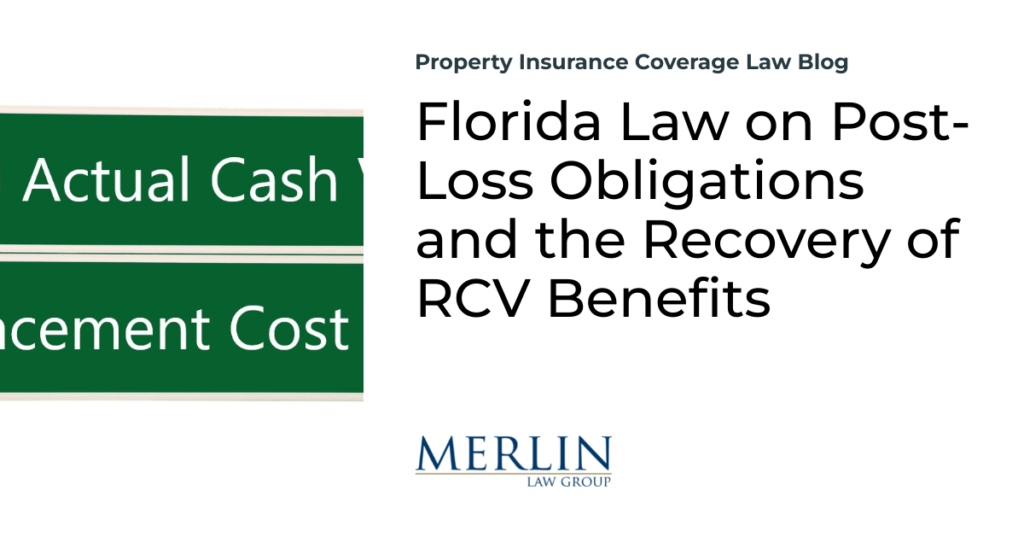Florida Law on Post-Loss Obligations and the Recovery of RCV Benefits

I recently posted about a court in Minnesota permitting the insured to seek the Replacement Cost Value (“RCV”) of its loss even though the property had not been repaired or replaced during ligation delays. Earlier this month, the 11th Judicial Circuit for Miami Dade County offered the Florida perspective on the subject.1
The insurer moved for summary judgment on the claim for both the increased costs of construction and replacement cost value of the loss. The insurer argued that the insurance policy prohibited recovery of these costs unless the repair or replacement of the property took place within two years of the date of loss.
The trial court found that the insurer’s denial based on the two-year timeline to repair or replace the property was moot.
Because there is no dispute that [the insurer] denied the [insured’s] claim outright within 90 days, this two-year repair/replace Policy term was rendered moot, does not apply to the Parties’ pre-lawsuit dealings and, therefore, compliance was not required. Enforcing this provision prior to providing coverage is like putting the cart before the horse.
The court stated that because the insurer denied the claim in 90 days, it rendered the insured’s obligation to notify the insurer of its intention to seek RCV benefits moot as well. The court found no provision in the insuring agreement that imposed continuing obligations on the insured after a denial of coverage. Thus, in order to disclaim coverage based on the insured’s post-loss duties, the insurer would have needed to first find coverage.
In addition to denying the insurer’s motion for summary judgment based on the policy’s plain language, the court found there was an issue of fact as to whether the insurer materially breached the policy. In Florida, a material breach by one party may be considered a discharge of the other party’s contractual obligations.
I know that my defense counsel friends are thinking: “But what about Buckley Towers.” The court also addressed that case:
For example, in Buckley Towers, the insurer did not deny the insured’s claim and construed the claim as a request for RCV damages. 395 F. App’x at 661- 62. The court held that the insured was bound by the insurance contract to comply with the RCV term to repair and replace the property, which the insured had not done. Id. at 663-64. The court distinguished a situation where an insurer wrongfully denies a claim denial (as here), acknowledging that Florida law holds that an insurer cannot rely on noncompliance with policy terms after a claim is denied. Id. at 664 n.1
Florida case law makes a clear distinction in the interpretation of these post-loss obligations based on whether an insurer denies coverage or accepts coverage and pays the Actual Cash Value of the loss. This is a win for policyholders whose claims are wrongfully denied. However, for policyholders that have their claims wrongfully underpaid to seek RCV benefits, they must either front the costs of repair or get a loan while fighting with their insurer. This, unfortunately, places an undue financial strain on policyholders fighting lowballed claims.
1 Majorca Isles I Condo. Assoc. v. American Coastal Ins. Co., No 2021-005183-CA-1 (Fla. Cir. Ct. Feb 9, 2023).







